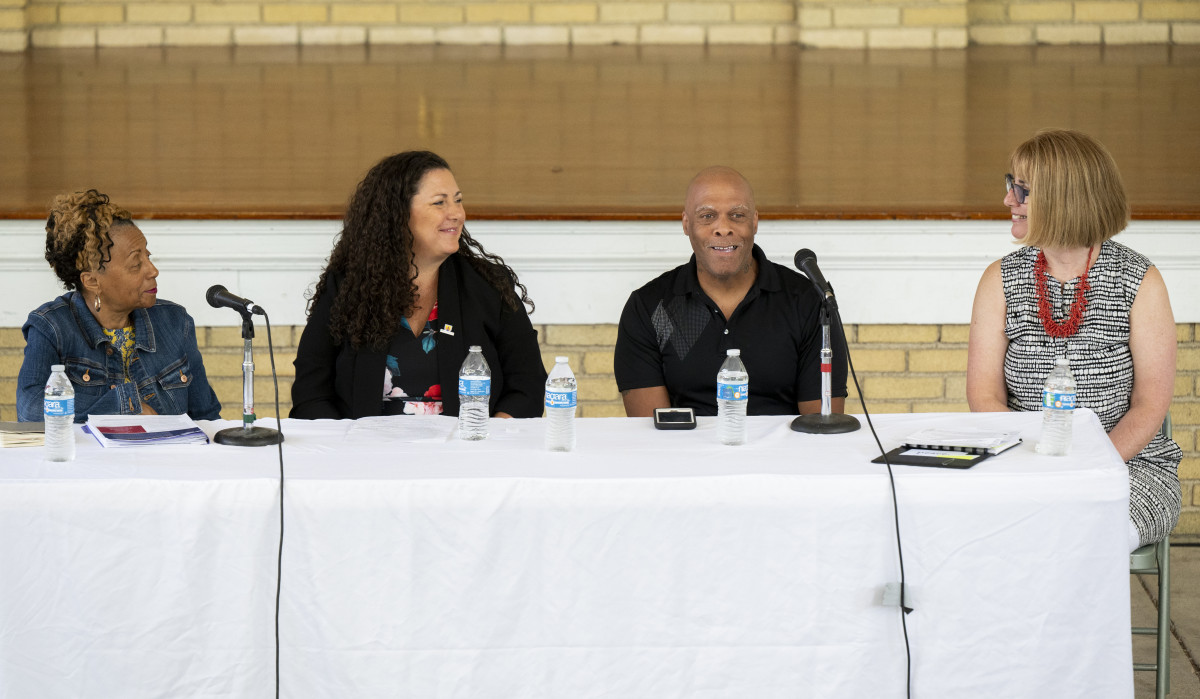Week Three presenting sponsor Erie Insurance hosted a panel discussion on Friday, July 15, in Smith Wilkes Hall of community leaders who are working to eradicate poverty, reduce recidivism and promote education for those living in poverty in and around Erie, Pennsylvania.
The panel included Climate Changers co-founder Fred Williams; Erie County Community College of Pennsylvania Dean of Student Support, Student Success and Enrollment Management Keri Bowman; and Erie Insurance CEO Action for Racial Equity fellow Gwendolyn White. Erie Insurance Chief Diversity and Community Development Officer Christina Marsh moderated the conversation.
“We were inspired by the theme of human rights here this week,” Marsh said of “The Future of Human Rights,” Week Three’s theme. “We thought if we could share some examples locally … it might inspire thinking.”
The panel discussed the challenges facing impoverished residents of Erie County, including life following incarceration, racism, lack of support for education and growing wealth gaps. Each panelist discussed their respective work to connect with county residents to address these issues and create solutions.
“There’s a plague that is going through the inner city, a very poisonous mentality,” Williams said. “The inner city has that mentality because there is no hope.”
Climate Changers is working to invert that trend. The organization incorporates a three-phase program to prepare incarcerated individuals to return to the workforce, reduce recidivism once individuals are released from prison, and promote lasting economic opportunity, Williams said.
“Freedom is a responsibility, and if you take a person’s freedom away from them … when their freedom is handed back to them, they don’t know what to do,” he said.
Climate Changers steps in to provide a support system to those who are released from prison by working with them directly to become engaged citizens.
“We’re very successful at changing people’s lives, and we’re proud of that,” Williams said; more than 2,000 participants have gone through the program, and each participant has registered to vote.
White is a fellow of the CEO Action for Racial Equity program, which was “founded on a shared belief that diversity, equity and inclusion is a societal issue, not a competitive one, and that collaboration and bold action from the business community — especially CEOs — is vital to driving change at scale,” according to the organization’s website.
White discussed the importance of diversity, equity and inclusion efforts at the corporate level. She underlined the need to change attitudes toward formerly incarcerated individuals in corporate culture and promote fair hiring practices toward people who are reentering the workforce. She said that fair hiring practices are a matter of social justice, as well as critical to economic development.
“Incarceration costs the United States $80 billion a year,” she said. “COVID revealed things that we already knew. … COVID-19 disparities have already widened the Black-white life expectancy gap.”
Erie County declared racism a public health crisis in 2020.
Bowman noted the role that education can play in creating generational economic opportunity, as well as the unique challenges — whether from lack of money or social support — that those living in poverty face in accessing education.
The mission of Erie County Community College is to “develop dynamic and diverse learners to advance their quality of life and Erie County’s economic growth through affordable access, innovative education and workforce training,” according to the college’s website.
“We need to change the mindset of people who are impoverished and those who are not impoverished,” said Bowman, who also discussed Erie County’s unique situation of being home to both urban and rural poor. “We are blending those groups to provide a safe space in our classroom. … We have no admission standards. If you want to come and study with us, you come and study with us. We have resources to meet people where they are.”
Currently, the college provides social support to students through efforts from faculty and staff. They aspire to soon create a more formal mentoring program to strengthen the social network for future classes of students.
Each panelist highlighted the role that local and national businesses play in supporting and promoting economic opportunity in communities.
“It’s about going into corporate boardrooms and changing mentalities,” Williams said. “Erie Insurance really has had a huge impact on the community, helping people and helping me change that mentality.”





